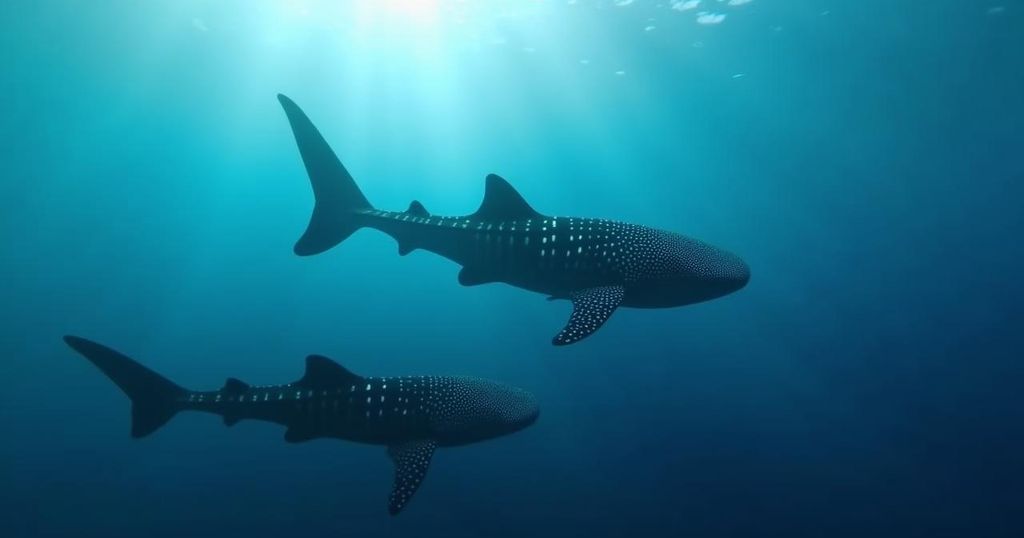Increasing Collision Risks for Whale Sharks Due to Warming Oceans and Shipping Traffic
A new study in Nature Climate Change indicates that rising ocean temperatures due to global warming could increase the likelihood of collisions between whale sharks and large vessels by 15,000 times by the end of the century. As whale sharks move into new habitats, particularly under high emissions scenarios, their core habitats may shrink significantly, particularly in Asia, while some areas may experience habitat gains with sustainable practices. Overall, marine conservation efforts must consider the impacts of climate change on whale sharks and their interactions with shipping traffic.
A recent study published in Nature Climate Change reveals that the risk of collisions between whale sharks and large shipping vessels is likely to escalate as ocean temperatures rise due to global warming. Conducted by researchers at the University of Southampton and the Marine Biological Association (MBA), the study indicates that as whale sharks adapt to new habitats driven by temperature increases, they may enter areas heavily trafficked by ships. The research predicts that by the end of the century, incidents of whale sharks being in proximity to large vessels could increase 15,000-fold compared to current frequencies. Lead author Dr. Freya Womersley, a Postdoctoral Research Scientist at the University of Southampton and MBA, noted, “These shifts in the whale sharks’ habitat were most extreme under high emission scenarios. A global reshuffling could lead to core habitat losses in some areas as well as increased co-occurrence with shipping traffic as oceans warm and other variables change.” Whale sharks, recognized as the largest fish species globally, are highly mobile and sensitive to temperature changes, rendering them vulnerable to fatal ship strikes. The research utilizes satellite tracking data of whale sharks in conjunction with global climate models to forecast the species’ future distribution under varying climate change scenarios. Notably, the models anticipate a significant reduction of core whale shark habitats, particularly in parts of Asia, potentially exceeding 50% loss by 2100 under high emissions scenarios. Conversely, efforts aligned with sustainable development could mitigate some of these impacts, allowing for habitat gains in regions like Europe. Professor David Sims, a co-author of the study and Senior Research Fellow at the University of Southampton and MBA, remarked, “The shifts we predict are likely to be less extreme if we are able to slow warming and mitigate climate change, suggesting that even complex, multi-factor impacts of climate change can be somewhat alleviated by our actions.” The comprehensive analysis revealed that newly emerging whale shark habitats in certain regions, including the North Pacific Ocean, Eastern China Seas, and North Atlantic Ocean, are projected to overlap significantly with busy shipping channels. However, some locations, like portions of the Gulf of Mexico, may see a decrease in overlap due to shifts in whale shark habitats towards coastal areas. Overall, the study indicates an increase in whale shark interactions with ships across all future climate scenarios, regardless of the anticipated growth in shipping traffic. Dr. Womersley stressed, “We show that climate change has the potential to indirectly impact highly mobile marine species through interacting pressures of humans and the environment. This highlights the importance of factoring climate change into discussions around endangered species management.” The research underscores the urgent need to consider the implications of climate change in conservation strategies and policy conversations surrounding whale sharks, as well as the broader marine ecosystem’s health.
The study addresses the impact of global warming on marine species, with a particular focus on whale sharks, which are currently classified as endangered. Whale sharks are known to be highly adaptive; however, their migration patterns are heavily influenced by temperature changes in the ocean. Increased shipping traffic in certain areas poses a substantial risk to these marine giants, making it imperative to study the intersection of climate change and marine conservation. With vehicle collisions being a persistent danger for marine wildlife, understanding future habitat distributions helps to inform better management and conservation practices.
The significant findings from the study underscore the potential increase in collision risks faced by whale sharks due to global warming and resulting shifts in their habitats. As projections indicate a 15,000-fold rise in encounters with shipping traffic, it is critical to integrate climate change considerations into marine conservation strategies. Sustainable practices and proactive measures can aid in mitigating the escalation of these risks, protecting vulnerable marine species such as the whale shark.
Original Source: www.eurekalert.org




Post Comment